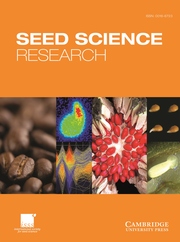Article contents
Soybean seed deterioration and response to osmotic priming: changes in specific enzyme activities in extracts from dry and germinating seeds
Published online by Cambridge University Press: 19 September 2008
Abstract
The effect of accelerated aging (AA) and seed priming on specific seed enzymes was studied in soybeans. Aging seeds for 48 and 96 h at 41°C and 100% humidity reduced germination from 92% to 68% and 0%, respectively. Malate dehydrogenase (MDH) glutamate dehydrogenase (GDH), and esterase were assayed in extracts from dry and imbibing seeds. Malate dehydrogenase activity was the least affected by AA treatments. Certain GDH isozyme activity was reduced by 17% after 48 h of AA and almost completely lost after 96 h. Imbibing for 24 h increased GDH activity in 48 h-accelerated-aged seeds but not the 96 h-aged seeds. Two esterase isozymes in dry seeds showed a 77% loss of activity after 48 h of AA. This treatment increased the total esterase activity, with the greatest activity observed after 96 h of AA. This was due to the appearance of a diffuse high molecular weight (HMW) region of activity observed on native polyacrylamide gels and specifically induced in the embryonic axes. Imbibing 48-h-accelerated-aged seeds for 48 h caused a reappearance of the two esterase enzymes lost during aging. The HMW esterase staining region also appeared after imbibing unaged seeds for 24 h. Seed priming, caused a response similar to imbibition for each enzyme except the HMW esterase activity. Priming 48-h-accelerated-aged seeds reduced the HMW esterase activity. This was not observed during imbibition of aged seeds and indicates the first identification of a specific enzymatic response unique to a seed priming treatment.
Keywords
Information
- Type
- Research papers
- Information
- Copyright
- Copyright © Cambridge University Press 1994
References
- 8
- Cited by

